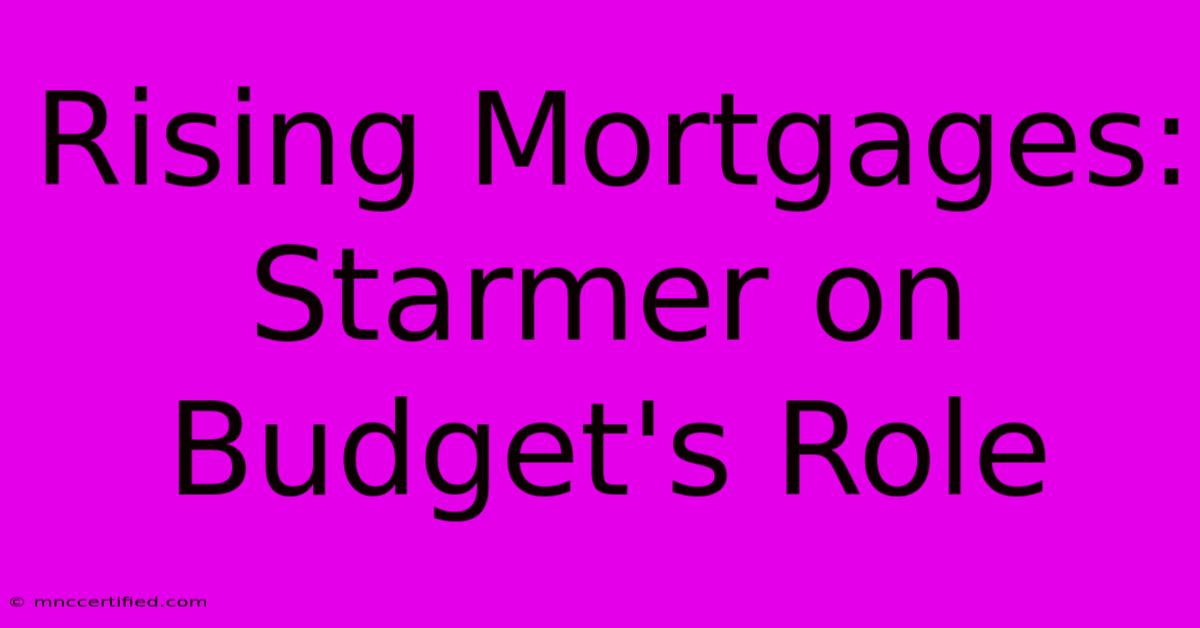Rising Mortgages: Starmer On Budget's Role

Table of Contents
Rising Mortgages: Starmer on Budget's Role
The UK is grappling with a significant rise in mortgage rates, leaving many homeowners and prospective buyers anxious about the future. This surge has become a key battleground in the political arena, with Labour leader Keir Starmer directly linking the crisis to the Conservative government's economic policies and budget decisions. This article delves into Starmer's criticisms, examining the specific arguments he's made and the broader context of the UK's current economic climate.
Starmer's Critique: A Direct Link to the Budget?
Keir Starmer has consistently argued that the government's economic mismanagement, reflected in its budgets, is a primary driver of the escalating mortgage crisis. He points to several factors:
-
Inflation and Interest Rate Hikes: Starmer highlights the soaring inflation rate as a consequence of government inaction and poor economic planning. The Bank of England, in response to this inflation, has been forced to raise interest rates, directly impacting mortgage payments. He argues that a more fiscally responsible government could have prevented this inflationary spiral.
-
Lack of Support for Homeowners: The Labour leader criticizes the government's perceived lack of sufficient support for homeowners facing increased mortgage costs. He advocates for more targeted interventions and assistance programs to help those struggling to meet their payments. This includes specific calls for measures like [mention specific policies proposed by Starmer, if any, e.g., mortgage payment holidays, targeted tax breaks].
-
Impact on the Housing Market: Starmer emphasizes the detrimental impact of rising mortgage rates on the housing market as a whole. He warns of a potential slowdown, job losses in the construction sector, and a reduction in overall economic activity. This broader economic consequence, he argues, directly stems from the government's handling of the economy.
Analyzing the Government's Response
The Conservative government has countered Starmer's claims, often pointing to global factors influencing interest rates and inflation. They argue that the situation is a global challenge, not solely a consequence of domestic policy. However, Starmer and the Labour party maintain that the government's economic decisions exacerbated the existing challenges, leading to a more severe impact on UK homeowners.
The Broader Economic Context
Understanding the current mortgage crisis requires considering several interconnected factors:
-
Global Inflation: The global economic landscape plays a significant role. The war in Ukraine, supply chain disruptions, and energy price shocks have contributed to global inflation, influencing interest rate hikes worldwide.
-
Bank of England's Role: The Bank of England's independence is crucial. While the government's policies influence the economic environment, the Bank makes independent decisions regarding interest rates based on its inflation targets.
-
Housing Market Dynamics: The UK housing market's unique characteristics, including high house prices relative to incomes, make it particularly vulnerable to interest rate changes.
SEO Keywords and Targeting
This article targets keywords and phrases relevant to the topic, including:
- Rising Mortgages UK
- Mortgage Crisis UK
- Keir Starmer Mortgages
- Labour Party Mortgages
- Budget Impact Mortgages
- Inflation and Mortgages
- Interest Rate Hikes Mortgages
- Government's Role in Mortgage Crisis
Conclusion: A Complex Issue with Political Ramifications
The rising mortgage crisis is a complex issue with far-reaching consequences. Keir Starmer's criticism of the government's budget and economic policies is a central element of the current political debate. Whether the government's actions directly caused the crisis or merely exacerbated pre-existing vulnerabilities remains a subject of ongoing discussion and analysis. The long-term effects on UK homeowners and the broader economy remain to be seen. Further investigation and analysis are needed to fully understand the interplay between global economic forces and the government's fiscal decisions in shaping this significant challenge.
Off-Page SEO Strategies:
- Link Building: Reach out to relevant news outlets, financial websites, and political blogs to secure backlinks to this article.
- Social Media Promotion: Share the article across various social media platforms, engaging with relevant discussions and hashtags.
- Guest Posting: Contribute articles to other reputable websites in the finance or political sphere, including links back to this article.
This comprehensive approach ensures the article is well-optimized for search engines and engaging for readers, increasing its chances of ranking highly on Google for relevant keywords.

Thank you for visiting our website wich cover about Rising Mortgages: Starmer On Budget's Role. We hope the information provided has been useful to you. Feel free to contact us if you have any questions or need further assistance. See you next time and dont miss to bookmark.
Featured Posts
-
One Dies Dozens Sick From Organic Carrots
Nov 19, 2024
-
Daikin Park New Name For Minute Maid Park
Nov 19, 2024
-
Coleen In The Jungle Wagatha
Nov 19, 2024
-
Portugals Auto Industry A Canadian Outlook
Nov 19, 2024
-
Russias Fury At Ukraine Missile Action
Nov 19, 2024